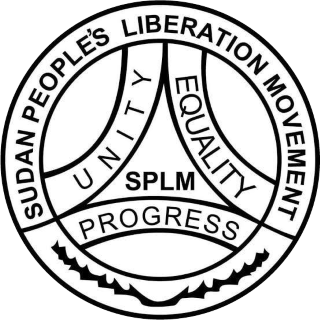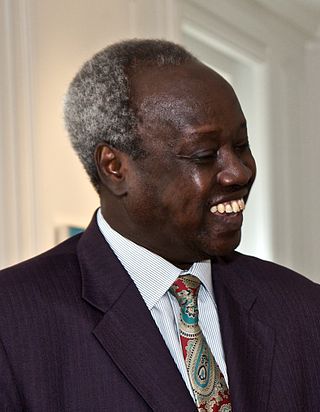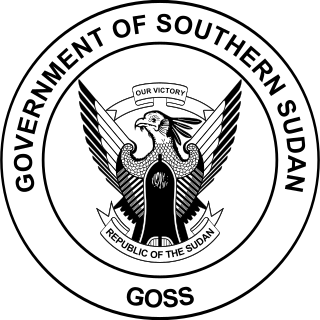 Samson L. Kwaje | |
| Languages | |
|---|---|
| Bari, English and Arabic | |
| Religion | |
| Christianity | |
| Related ethnic groups | |
| Nilotic peoples |
Samson Lukare Kwaje (July 23, 1945 - August 1, 2010) was a South Sudanese politician and civil servant.
 Samson L. Kwaje | |
| Languages | |
|---|---|
| Bari, English and Arabic | |
| Religion | |
| Christianity | |
| Related ethnic groups | |
| Nilotic peoples |
Samson Lukare Kwaje (July 23, 1945 - August 1, 2010) was a South Sudanese politician and civil servant.
Samson Kwaje was a senior member of the Sudan People's Liberation Movement's Political Bureau, the highest political organ of the former rebel movement that now governs South Sudan. Before joining the SPLM in early 1990s, he held the position of Director General of the Ministry of Agriculture from 1983 - 1986, and from 1986 - 1989 he was Minister of Finance and Economic Planning in the Equatoria Regional Government based in Juba. [1] From 1995 to 2004, Samson Kwaje was put in charge of information desk in the Sudan People's Liberation Movement/Army and became its official spokesperson. He also played a great role during the Naivasha peace talks with the then Government of Sudan which led to the signing of the Comprehensive Peace Agreement (CPA) in 2005. He became a signatory to CPA when he signed in May 2004 the Power Sharing Protocol in Naivasha, Kenya. In 2005 during the formation of the Government of Southern Sudan, Samson Kwaje was appointed the first Minister of Information and Broadcasting. In 2008 he became the Minister of Agriculture and Forestry during a reshuffle. Samson Kwaje had been holding the post even after the elections when the government was formed. Samson Kwaje was the head of the presidential campaign team for the SPLM Chairman and current President, Salva Kiir. [2]
Born in the mid 1940s, Kwaje obtained his master's degree in Agriculture (Plant Pathology) at Makerere University in Uganda in 1974 and a PhD in agriculture from the West Virginia University in Morgantown, West Virginia, USA in 1979. [3] Kwaje was from the Pojulu Tribe from Central Equatoria. On Sunday November 15, 2009 an ambush on his vehicle outside Juba, in Central Equatoria State, resulting from a localized political issue, wounded Kwaje and killed five others. [4] Kwaje died after three weeks in intensive care at the Aga Khan Hospital in Nairobi, Kenya, on Sunday 1 August 2010. [5] Kwaje left behind two spouses and seven children. [6]

Equatoria is a region of southern South Sudan, along the upper reaches of the White Nile. Originally a province of Anglo-Egyptian Sudan, it also contained most of northern parts of present-day Uganda, including Lake Albert and West Nile. It was an idealistic effort to create a model state in the interior of Africa that never consisted of more than a handful of adventurers and soldiers in isolated outposts.

Central Equatoria is a state in South Sudan. With an area of 43,033 square kilometres (16,615 sq mi), it is the smallest of the original South Sudanese states. Its previous name was Bahr al-Jabal, named after a tributary of the White Nile that flows through the state. It was renamed Central Equatoria in the first Interim Legislative Assembly on 1 April 2005 under the government of Southern Sudan. Central Equatoria seceded from Sudan as part of the Republic of South Sudan on 9 July 2011. The state's capital, Juba, is also the national capital of South Sudan. On October 2, 2015, the state was split into three states: Jubek, Terekeka, and Yei River. The state of Central Equatoria was re-established by a peace agreement signed on 22 February 2020.

John Garang de Mabior was a Sudanese politician and revolutionary leader. From 1983 to 2005, he led the Sudan People's Liberation Army (SPLA) after the Second Sudanese Civil War, the comprehensive peace agreement of 2005 was signed and he briefly served as First Vice President of Sudan for 3 weeks until his death in a helicopter crash on July 30, 2005. A developmental economist by profession, Garang was a major influence on the movement that led to the foundation of South Sudan.

The Sudan People's Liberation Movement is a political party in South Sudan. It was initially founded as the political wing of the Sudan People's Liberation Army in 1983. On January 9, 2005 the SPLA, SPLM and Government of Sudan signed the Comprehensive Peace Agreement, ending the civil war. SPLM then obtained representation in the Government of Sudan, and was the main constituent of the Government of the then semi-autonomous Southern Sudan. When South Sudan became a sovereign state on 9 July 2011, SPLM became the ruling party of the new republic. SPLM branches in Sudan separated themselves from SPLM, forming the Sudan People's Liberation Movement-North. Further factionalism appeared as a result of the 2013-2014 South Sudanese Civil War, with President Salva Kiir leading the SPLM-Juba and former Vice President Riek Machar leading the Sudan People's Liberation Movement-in-Opposition.

The politics of South Sudan concern the system of government in the Republic of South Sudan, a country in East Africa, and the people, organizations, and events involved in it.

Lieutenant General Nhial Deng Nhial is a South Sudanese politician and a member of the ruling Sudan People's Liberation Movement (SPLM). He was Minister of Foreign Affairs 2011 to 2013 and 2018 to 2019 after having served as the caretaker Minister of Defense since 10 July 2011. Prior to that he served as the pre-independence South Sudanese Minister of SPLA and Veteran Affairs, from 22 December 2008 until 9 July 2011.

The Comprehensive Peace Agreement, also known as the Naivasha Agreement, was an accord signed on January 9, 2005, by the Sudan People's Liberation Movement (SPLM) and the Government of Sudan. The CPA was meant to end the Second Sudanese Civil War, develop democratic governance countrywide, and share oil revenues. It also set a timetable for a Southern Sudanese independence referendum.

Lt Gen Dominic Dim Deng was a senior member of the Sudan People's Liberation Army, a distinguished military veteran general and the first defence minister in the Government of Southern Sudan who lost his life alongside his wife Madam Josephine Apieu Jenaro Aken, senior politician Dr. Justin Yac Arop and 18 other Sudan People's Liberation Army and Government of Southern Sudan officials on a leased CEM Air Beechcraft 1900 that crashed 375 km west of Juba, Sudan on May 2, 2008.
Lainya is a county in Central Equatoria State, South Sudan. Emmanuel Khamis Richard is the current commissioner of Lainya County.

The Southern Sudan Legislative Assembly was established in 2005 by the Interim constitution of the Southern Sudan 2005. Pending elections in 2010, all 170 members were appointed according to the following formula as per the Comprehensive Peace Agreement (CPA): 70% of seats to SPLM, 15% to NCP, and 15% to other parties. The Assembly met in Juba, The capital of Southern Sudan and Central Equatoria State.
Jimmy Lemi Milla was a Sudanese politician, and Cabinet member in Southern Sudan. He was a Pojulu.

Southern Sudan was an autonomous region consisting of the ten southern states of Sudan between its formation in July 2005 and independence as the Republic of South Sudan in July 2011. The autonomous government was initially established in Rumbek and later moved to Juba. It was bordered by Ethiopia to the east; Kenya, Uganda, and the Democratic Republic of the Congo to the south; and the Central African Republic to the west. To the north lies the predominantly Arab and Muslim region directly under the control of the central government. The region's autonomous status was a condition of a peace agreement between the Sudan People's Liberation Army/Movement (SPLA/M) and the Government of Sudan represented by the National Congress Party ending the Second Sudanese Civil War. The conflict was Africa's longest running civil war.
The Southern Sudan Peace Commission (SSPC) was established in 2006. The purpose of the Peace Commission is promote peace among the people of South Sudan and to help consolidate the results of the Comprehensive Peace Agreement (CPA) signed in January 2005 between the Sudan People's Liberation Movement (SPLM) and the Government of Sudan.
Dr Barnaba Marial Benjamin Bil is a South Sudanese politician. He was appointed in April 2021 as the minister of Presidential Affairs in the office of the President as of 2022 replacing Nhial Deng Nhial.
Joseph Ukel Abango, commonly known as Joseph Ukel, is a veteran-politician of what is now South Sudan and an educationalist by profession.
Hon. Jemma Nunu Kumba is a South Sudanese politician. She is the current Minister of Gender, Child and Social Welfare of South Sudan. She founded the Sudan women Parliamentary Caucus in 2004 at the start of the comprehensive peace agreement. She was chosen by the SPLM as the speaker of the Revitalised Transitional National Legislative Assembly (R-TNLA). She became the first woman to preside over the parliament of South Sudan.

Stephen Dhieu Dau Ayik is South Sudanese politician, banker by profession, and financial technocrat. He is a proven professional and held various cabinet positions in the Government of the Republic of South Sudan. He is a senior member of Sudan’s People Liberation Movement (SPLM) and had served in various cabinet positions. Stephen Dhieu Dau was the Minister of Finance and Planning until March 2018 in the RSS. He served as Minister of Petroleum and Mining and Minister of Commerce and Industry. Stephen Dhieu Dau is from Melut County, Upper Nile State, and belongs to the Nyiel section of the Padang Dinka ethnic group. In October 2022, President Salva Kiir appointed Stephen Dhieu Dau as the Chairperson of the Board of Directors of the National Revenue Authority. In December 2022, He was appointed as a member of the SPLM Political Bureau.

Pa'gan Amum Okiech is a South Sudanese politician. He is the co-founder of South Sudan Reborn, a political organisation that attempts to bring peace to South Sudan and is the primary spokesperson. He is also the head of the SPLM-Former Detainees (SPLM-FD).
Joseph Oduho Haworu was a leading politician from South Sudan who was active in the struggle for independence and a founding member of the Sudan People's Liberation Movement (SPLM). He was part of South Sudan liberation
Elijah Malok Aleng was a South Sudanese public servant, general, and politician, from [Twic Dinka/Twi East county] in Jonglei State. He was born on 28 November 1937 at Thianwong village when his family was living among the Pen people in Angakuei in Baidit, about 20 miles northeast of Bor town. His family, which is originally from Awulian in Wangulei, Twic East County, migrated back to be with fellow Awulian kinfolks. He attended Malek Primary School (1950–1953), and then Juba Intermediate School and Juba Commercial Senior Secondary School, graduating He then attended Free University of the Congo, in the present Democratic Republic of Congo (DRC), and later got a scholarship to study in Fribourg Catholic University, Switzerland, from which he obtained a master's degree in economics in 1972. In 1975 he obtained another Masters in Development Studies and Economic Planning from Wolfson College, Cambridge in the United Kingdom. In his memoirs: the Southern Sudan: Struggle for Liberty, named Chief Deng Biar Abit, leader of the Awulian clan, Paul Logali, former finance minister of Southern Sudan regional government and Akec Kwai Biar, former Bor District Commissioner and his cousin as the people who positively influenced him.